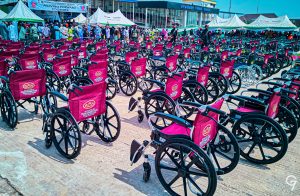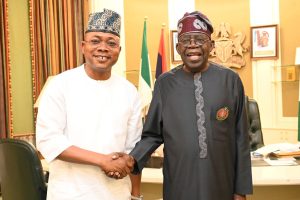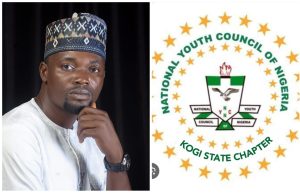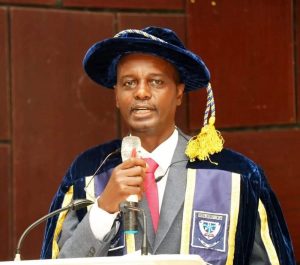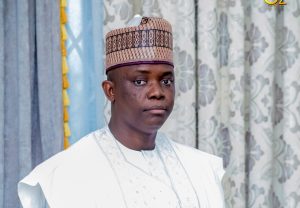COMMUNIQUE ISSUED AT THE END OF A ONE-DAY RETREAT AND COLOQUIUM HELD BY THE SCHOOL OF ARTS AND SOCIAL SCIENCES OF THE FEDERAL COLLEGE OF EDUCATION AT THE ARTS AND SOCIAL SCIENCES AUDITORIUM ON 20TH SEPTEMBER, 2022
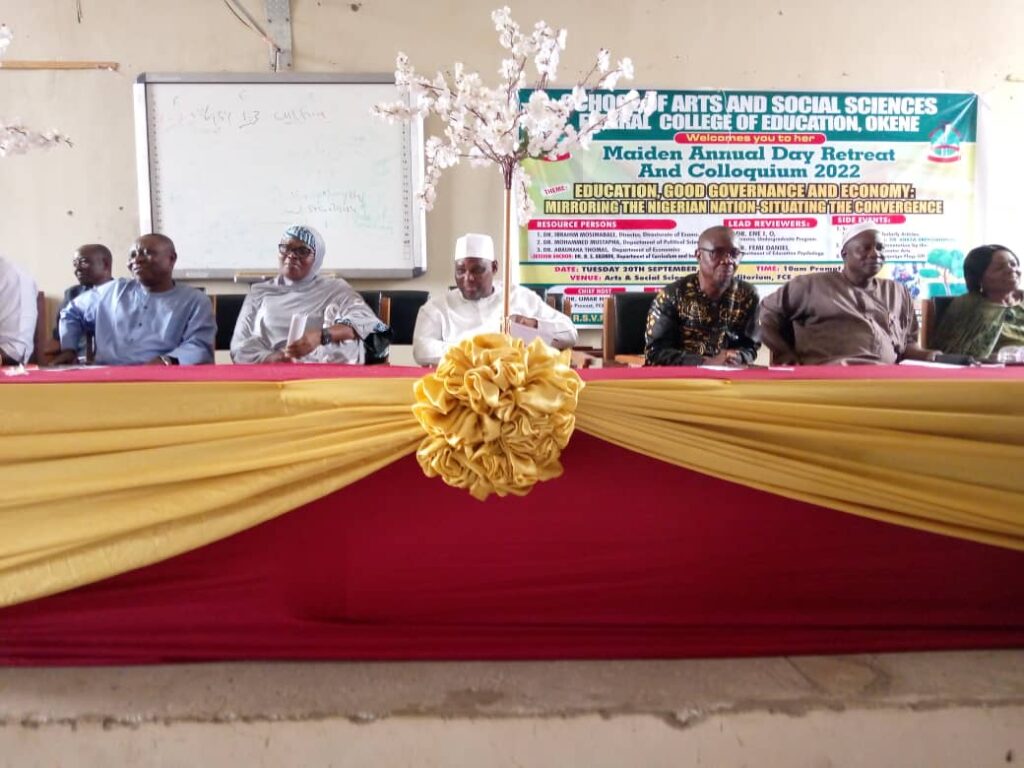
1.0 INTRODUCTION
The School of Arts and Social Sciences is one of the foundation schools in the Federal College of Education, Okene that has maintained a strategic and frontline position since the establishment of the college in 1974. Housing eight departments, the school is not only the biggest in terms of staff strength but equally in terms of student population. Departments of Christian Religious Studies, Islamic Studies, Economic, Geography, History, Music, Social Studies, Political Science and Theatre and Performing Arts make up the school.
The school held its maiden Annual Day Retreat on 20th September, 2022 at the Arts and Social Sciences Mini Auditorium of the college. The one-day retreat featured a tree planting campaign exercise, a colloquium, and drama and music rendition amongst other events.
2.0 Attendance
In attendance at the Retreat were resource persons and seasoned scholars from within and outside the college. Chief among them were, Dr. Umar Hassan, the Provost of the college (FCE, Okene) – the Chief Host; Prof Zubair A.O., Department of History and International Studies, Federal University, Lokoja, represented by Dr, Habib Enesi of the same University – Special Guest of Honour; Dr. Habiba Suileman, the Deputy Provost of the college (FCE, Okene); Mr. J. K. Abdul, the Acting Registrar, FCE, Okene; Dr. Okpanachi, the Chairman, Deans and Directors, FCE, Okene; Dr. Thomas Abaukaka, Dr. Ibrahim Mosimabale and Dr. Mustapha Mohammed (both of whom were represented by Dr. Ayo Ekunwale and Mr. Yusuf Tijani of Music and Political Science departments respectively)- discussants 1, 2, and 3; Dr. B. S. Akande, Session Anchor; Dr. Femi Daniel and Mr. Suleiman Joseph, paper reviewer 1 & 2. Others include past Deans of the school and that of other schools in the college, Directors of units, Heads of Departments, senior academic and non-academic staff members and students.
3.0 Deliberations and Discussions
The sessions started with addresses by the Mr. Uzoma Hyacinth, Dean of the school and Dr. Umar Hassan, the Provost of the college, both men doubling as the Host and Chief Host of the retreat respectively. These personalities did set the ball rolling for the day’s business. Their addresses essentially revolved around the critical issues of education, nation building and development- amplifying the premise upon which the theme of the colloquium, “Education, Good Governance and Economy: Mirroring the Nigerian Society” stands. Being the first of its kind in the college community, the retreat
appropriated itself to a moment of stocktaking for the school, college and, by extension, the Nigerian society as a whole that has increasingly displayed incapacitation to realize its dream of greatness through a functional education system, leadership and luxuriant economy. The retreat resonated with the desire of the school to create an outlook that is founded on impacting learning experiences which are knowledge-driven and environmental sustainability, hence, the incorporation of the tree planting campaign flagged off by the provost of the college. Quality papers by the three discussants which were guided by the theme of the colloquium and their subsequent reviews by the reviewers provoked boisterous questions and contributions from other participants at the event.
4.0 Questions Raised :
The retreat did put forth the following rhetorical questions:
- Has the Nigerian state been able to effectively manage her educational system in a symbiotic relationship with management of the resources of the country for the development of the good of its teaming population or can a country be developed or industrialized or grow without good education, good leadership and governance or can Nigeria be said to have used its resources wisely?
- What has led to the current challenges of education in Nigeria that have manifested themselves in poor funding (poor educational infrastructure- inadequate classroom, teaching aids – projectors, computers, laboratories, and modern libraries)?
- Given the deep-seated and seemingly intractable corruption entrenched in the fabric of the Nigerian society which largely accounts for her inability to attain sound education, governance and economy, should it (corruption) be legalized so that its proceeds can be captured as a source of income and revenue for the economy?
- How can we build a society without the dynamism of educated youths and the skills sets of professionals to nurture the economy- the seven months strike by the Academic Staff Union of Universities (ASUU) speaks volume of the value education enjoys in Nigeria?
- As individuals and organization, can we afford to continue to look away, standing aloof while the earth’s forest in depleted with reckless abandon – eating today at the expense of tomorrow?
5.0 Observations and Affirmations
After extensive deliberations, the retreat made the following observations, that:
The three social concepts of education, good governance and economy are inextricably interlaced in a manner that a bow to one is an obeisance to the three – a society that has got sound education shall, most likely, have good governance and buoyant economy fall in line;
- Education is the core component of human capital which provides the individuals, organizations and nations to acquire skills and developed talents for improved income, competitiveness, innovations and sustainable governance;
- Education should liberate a people from poverty by equipping with necessary skill sets for productivity and self-reliance but, sadly, education is on a life support in Nigeria- a situation that calls for an urgent declaration of state of emergency in the sector;
- Education is critical to break the ice of poverty, unemployment, illiteracy, nepotism, inequality, insecurity, and unstable economic prosperity of Nigeria;
- In Nigeria, all indices available to indicate the degree of wellness of the citizens which reveals the socio-economic conditions and welfare state of the citizens are worrisome;
- There are certificated educated persons with varying educational Degrees across the length and breadth of the country, but education has not achieved its goal of defeating poverty, transforming the economy and birthing good governance;
7 Good governance is the basis for strong education and economy in any given nation, whether resource abundant or otherwise – a government that is responsible, accountable and transparent in policy formulation and implementation;
- The cardinality of education in fostering good governance and strong economic position cannot be overemphasized, but there is need for a summit concerning education and leadership in Nigeria where citizens can proffer workable solutions to the myriad of socio-economic problems confronting the nation;
- Good governance refers to the question of how a society can organize itself to ensure equality of opportunity and equality (social and economic justice) for all citizens, as it promotes people-centred development;
- With effective leadership, elimination, eradication, or minimization of corruption to the barest minimum as well as good governance, the Nigerian economy will be to grow to meet with the level of developed countries;
- In Nigeria, corruption among the leadership class becomes the principal means of private accumulation of public wealth since the decolonization period till date;
- Nigeria has the most expensive cost of governance, starting from the local government to federal government without any commensurate material return to show for it – what it costs Nigeria to govern Nigeria in six months is a two year budgets for some African countries;
- The nation of Nigeria should adopt the parliamentary system of government with a unicameral legislation at a lesser cost of funding;
- The entire humankind faces the danger of possible extinction as a result of climate change and the resultant global warming largely caused by anthropogenic activities – we must remain conscious of the ticking time bomb (climate change).
6.0 Resolutions
Consequent upon the above deliberations and observations, the following resolutions came forthwith:
1 The school, going forward, will remain steadfast in the campaign for a functional education in Nigeria through innovative teaching and enhanced research environment by the instrumentality of periodic workshops, seminars and conferences;
- The school shall champion annual tree planting campaign across the college community and its environs – an effort to be managed by the Department of Geography of the school;
- The retreat shall remain an annual flagship program of the school through which policy makers, government and private agencies and other stakeholders will be furnished with ideas and technical know-how necessary for the realization of the much desired functional education, good governance and vibrant economy for the development of the Nigerian state.
7.0 Conclusion
The retreat has, among other things, come as a wakeup call to action as it provided a platform for scholars and stakeholders to interrogate the journey of education, governance and economy in the Nigerian state thus far. It represented an important landmark in the efforts of the School of Arts and Social Sciences, a leading component of the college community, to advance teaching, researching and community service which are the primary objectives of the college. Eloquently brought to the fore by the retreat were the facts that the state of education, governance and economy are nowhere near where it should be, and that all, individuals and organizations alike, have a responsibility to mitigate climate change, and that one of the effecttive and cheapest ways of taking out carbon dioxide from the air and helping to tackle climate change is by planting trees today.
Communique Drafting Committee
- Mr. Mohammed S. T.,
Department of Political Science; - Dr. Thomas Abaukaka,
Department of Economics; - Mrs. Mariam O. Abdulsalam,
Arts and Social Sciences Secretariat; - Baba Abdulrazak,
Department of Geography.
Signed:
Mr. Uzoma Hyacinth,
The Dean,
School of Arts and Social Sciences

